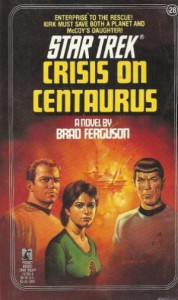A great invocation of the ideals at the heart of Star Trek

The Star Trek franchise is filled with thrilling tales of Starfleet crews exploring strange new worlds, battling hostile alien species, and even resolving personal conflicts. What you don't see too many stories of, though, are ones about the politics of humanity in their far-off future. Sure there are some (the "Terra Prime" storyline from the Star Trek: Enterprise series comes to mind), but they stand out for their rarity and for understandable reasons. After all, just how appealing is a novel about politics in a world of starships and aliens?
Brad Ferguson's novel demonstrates the falsity of such assumptions. On the Earth colony of Centarus, a political extremist detonates a device that wipes out an entire city. Though plagued with a series of computer problems, the Enterprise is dispatched by Starfleet to provide assistance. They arrive to find a planet coping with an unprecedented crisis, with hundreds of thousands dead and the technological infrastructure upon which Federation citizens had come to rely wiped out, forcing the Enterprise crew to overcome a variety of technological problems as they attempt to aid the population, all while dealing with planetary leaders with a slightly different agenda.
Like so many stories from the first quarter-century of the franchise, Ferguson's novel incorporates elements of the Cold War into it, serving as both commentary and cautionary tale. Yet the novel's great strengths are in its plot and Ferguson's portrayal of a starship crew rising to the challenge by addressing the problems before it. In that respect it invokes the idealism of the franchise by showing humanity at its best while also criticizing those elements which fly in the face of the values at the heart of Gene Roddenberry's creation. It is these elements which make Ferguson's novel one of the best produced in the Pocket Books series, as well as demonstrating the rich possibilities that exist in developing other, less-frequently explored aspects of the Star Trek universe.
 1
1






